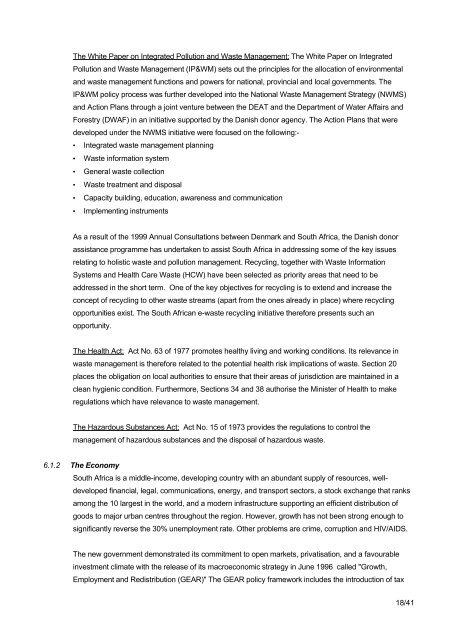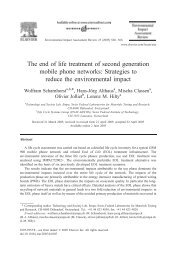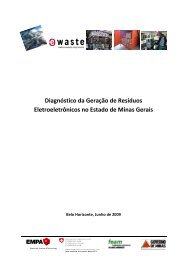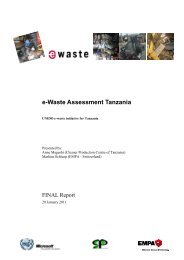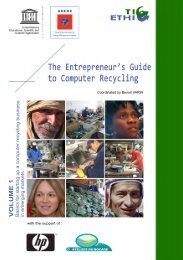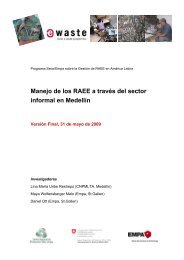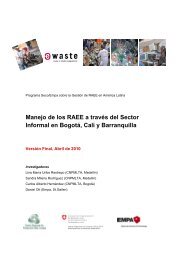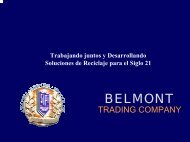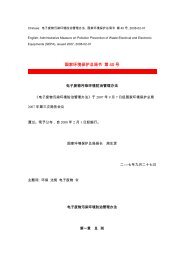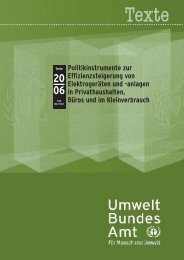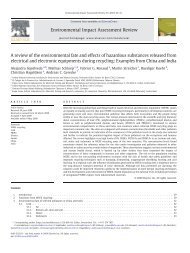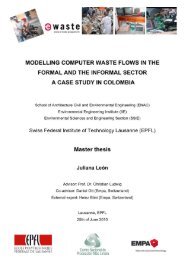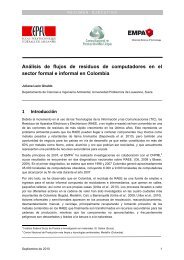E-WASTE ASSESSMENT IN SOUTH AFRICA - e-Waste. This guide
E-WASTE ASSESSMENT IN SOUTH AFRICA - e-Waste. This guide
E-WASTE ASSESSMENT IN SOUTH AFRICA - e-Waste. This guide
You also want an ePaper? Increase the reach of your titles
YUMPU automatically turns print PDFs into web optimized ePapers that Google loves.
The White Paper on Integrated Pollution and <strong>Waste</strong> Management: The White Paper on IntegratedPollution and <strong>Waste</strong> Management (IP&WM) sets out the principles for the allocation of environmentaland waste management functions and powers for national, provincial and local governments. TheIP&WM policy process was further developed into the National <strong>Waste</strong> Management Strategy (NWMS)and Action Plans through a joint venture between the DEAT and the Department of Water Affairs andForestry (DWAF) in an initiative supported by the Danish donor agency. The Action Plans that weredeveloped under the NWMS initiative were focused on the following:-• Integrated waste management planning• <strong>Waste</strong> information system• General waste collection• <strong>Waste</strong> treatment and disposal• Capacity building, education, awareness and communication• Implementing instrumentsAs a result of the 1999 Annual Consultations between Denmark and South Africa, the Danish donorassistance programme has undertaken to assist South Africa in addressing some of the key issuesrelating to holistic waste and pollution management. Recycling, together with <strong>Waste</strong> InformationSystems and Health Care <strong>Waste</strong> (HCW) have been selected as priority areas that need to beaddressed in the short term. One of the key objectives for recycling is to extend and increase theconcept of recycling to other waste streams (apart from the ones already in place) where recyclingopportunities exist. The South African e-waste recycling initiative therefore presents such anopportunity.The Health Act: Act No. 63 of 1977 promotes healthy living and working conditions. Its relevance inwaste management is therefore related to the potential health risk implications of waste. Section 20places the obligation on local authorities to ensure that their areas of jurisdiction are maintained in aclean hygienic condition. Furthermore, Sections 34 and 38 authorise the Minister of Health to makeregulations which have relevance to waste management.The Hazardous Substances Act: Act No. 15 of 1973 provides the regulations to control themanagement of hazardous substances and the disposal of hazardous waste.6.1.2 The EconomySouth Africa is a middle-income, developing country with an abundant supply of resources, welldevelopedfinancial, legal, communications, energy, and transport sectors, a stock exchange that ranksamong the 10 largest in the world, and a modern infrastructure supporting an efficient distribution ofgoods to major urban centres throughout the region. However, growth has not been strong enough tosignificantly reverse the 30% unemployment rate. Other problems are crime, corruption and HIV/AIDS.The new government demonstrated its commitment to open markets, privatisation, and a favourableinvestment climate with the release of its macroeconomic strategy in June 1996 called "Growth,Employment and Redistribution (GEAR)" The GEAR policy framework includes the introduction of tax18/41


